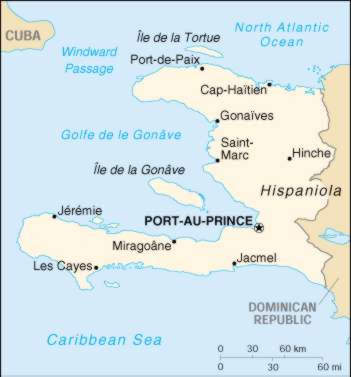
Si le littoral nord d'Haïti a été une terre à pirates, avec leur célèbre repaire de l'île de la Tortue, celui du sud, entre Jacmel et la petite ville de Marigot, est devenu la côte des narcotrafiquants. Pour une première bonne raison : Jacmel est situé en face du port de Barranquilla, en Colombie. A un millier de kilomètres de là. Depuis une dizaine d'années, une large partie du trafic de cocaïne à destination des Etats-Unis passe par Haïti. Au moins 15 %, selon les estimations officielles. La République dominicaine voisine, pourtant plus vaste et riche en infrastructures, ne compte que pour 5 %. Cela fait d'Haïti la première plaque tournante de la région.
Pas de tour de contrôle
Jusqu'à la chute d'Aristide, le 29 février, le trafic à Jacmel était en plein essor. En témoigne la construction, presque achevée, d'un aéroport à la sortie de la ville, distante seulement d'une heure et demie de Port-au-Prince par la route. Pas de tour de contrôle prévue. Ni de téléphone. Mais la piste est longue de... 1 200 mètres. Et a dû coûter une jolie fortune. Car la drogue n'arrive pas que par bateaux. Des avionnettes sont aussi utilisées, de même que pour sa réexportation aux Etats-Unis. D'où des atterrissages remarqués sur certaines routes nationales, notamment la n° 1 et la n° 9. Pour dissuader les Haïtiens de les emprunter la nuit, les trafiquants ont fait courir la rumeur qu'elles étaient hantées par les zombies (fantômes d'un mort dans la croyance populaire).
Développant les réseaux, plaçant ses barons, Jean-Bertrand Aristide, le président déchu, a favorisé l'essor du trafic de drogue sur l'île. Quant aux opposants qui l'ont renversé, certains ont les mains pleines de poudre.
Haïti, régime sous cocaïne.
Airports in Haiti
Map of Tortuga = l'île de la Tortue
Narcotics Trafficking
While the U.S. forces had little problem finding the boats stuffed full with refugees, there was a huge amount of drug trafficking that went undetected beneath the radar. Besides receiving vital aid from American corporations, the military leadership in Haiti also got around the effects of the embargo through a lucrative drug-smuggling operation that added millions of dollars a year to their coffers.
The DEA revealed that Haiti and the Dominican Republic were stop over points for cocaine coming from Colombia to the United States. They also revealed that one to four tons were coming in monthly from Haiti alone. According to Aristide's antidrug czar, Patrick Elie, police chief Michel Francois, whose "attaches" were responsible for a large number of murders and unnecessary violence, had been in the center of the trade. Indicted in 1997 on charges he and six others ran a smuggling ring for a decade, Francois is now a fugitive.
Elsie also reported that the CIA had been heavily involved with the military since before the election, and were cooperating with members involved in the drug trade, providing protection from outside inquiries and aiding in administrative construction internally. He says the CIA helped create the Haitian National Intelligence Service, which was a front. Supposedly the HNIS was to combat drug-smuggling but in reality the office was involved in protecting the trade, intimidating political opponents and assassinations.
While increased drug traffic through Haiti brought drugs to the streets with all the desperate flavors cocaine adds to impoverished settings, Aristide's return in the end of 1994 allowed for blame of governmental involvement to switch from the military to Aristide himself. It is no easy task to portray a priest, popularly elected by the people, as a major player in the country's narcotics trafficking, while relegating the engrained military, who ignore the will of the people through intimidation and murder, as innocent bystanders effected by his unfair means of support.
As reports come out of Haiti that the rebels have funded their operations through narco-profits, Aristide has had to vehemently counter arguments that he is in fact involved. Maybe everyone's involved, but Aristide using the factions in the military that are a part of this, the very ones who ousted him, seems unlikely. One of the top rebel leaders, Guy Philippe, is believed to have a played a significant role in illicit profits during his tenure in the police force in the 1990s. However it was Aristide, convicted dealer Jacques Ketant claimed in a courtroom in Miami, that was responsible for Haiti turning into a "narco-country"